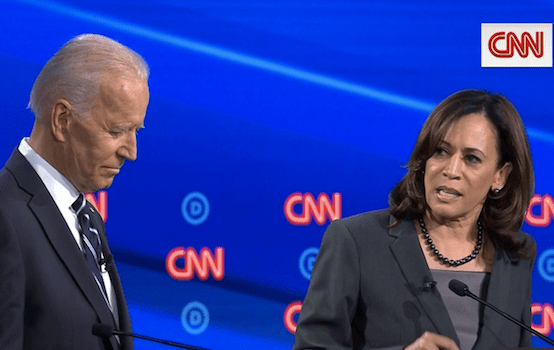What Is Kamala Harris’ Foreign Policy?

Kamala Harris’ foreign policy record is coming under closer scrutiny now that she has been named as Biden’s running mate. The record shows a mix of fairly conventional liberal internationalist commitments with encouraging signs of opposition to some of our more reckless policies overseas. Harris has made some relatively hawkish noises on certain issues, such as North Korea, but her voting record on Yemen and Saudi Arabia over the last few years has been quite good. Joe Cirincione reviewed her record earlier this week, and he described her opposition to the war on Yemen:
Specifically, Harris cosponsored and voted for S.J.Res. 7, legislation directing the president to withdraw U.S. military support for the war in Yemen. “What’s happening in Yemen is devastating. Thousands of children have died and last year alone, the war killed on average 100 civilians a week. Enough is enough. I voted YES today on a resolution to end the United States’ support for the Saudi-led coalition’s war in Yemen,” she tweeted after voting for the measure back in March of 2019.
The national anti-war group Peace Action favorably notes that Harris has “consistently voted to block arms sales to Saudi Arabia since the start of its brutal intervention in Yemen” and that she wants to remove most U.S. troops from Afghanistan, while leaving a residual force to support the Afghan government.
It is worth underlining here that Harris was an early opponent to arms sales to the Saudis. That suggests that she could influence a Biden administration foreign policy in the right direction when it comes to reassessing the relationship with the Saudis. She has said that “we need to fundamentally reevaluate our relationship with Saudi Arabia, using our leverage to stand up for American values and interests.” It remains to be seen if she and Biden would follow through on that, but it is the right position to take. Her opposition to the war on Yemen could help keep Biden from backtracking on his belated pledge to end U.S. involvement in the war. She objected to Trump’s quasi-withdrawal in Syria because of the process (or lack thereof), but she has also said that she wants to get U.S. forces out of Afghanistan, Iraq, and Syria.
Other parts of her record are more conventional. She is described as being more “AIPAC than J Street” on matters related to Israel, and the same could be said of Biden. Harris says that she opposes further Israeli annexations, but she also opposes conditioning aid to Israel, so that doesn’t mean much. Like many other Democrats, Harris criticized Trump for “embracing” Kim Jong Un, and during one debate performance she responded to a question about possible concessions to North Korea and said, “There are no concessions to be made.” The answer her campaign gave to the Council on Foreign Relations when she was a presidential candidate is also not very encouraging:
Ultimately, we can’t accept North Korea as a nuclear weapons state. But it’s clear that simply demanding complete denuclearization is a recipe for failure; we must work closely with our allies to contain and reverse the short-term threats posed by Pyongyang as we work toward that long-term goal.
In any negotiations with North Korea, we must proceed with great skepticism given our past experiences. I would consider targeted sanctions relief to improve the lives of the North Korean people if the regime were to take serious, verifiable steps to roll back its nuclear program. And that relief would have to be immediately reversible were they to renege on their commitments.
Since North Korea is a nuclear weapons state whether we accept it or not, this seems like an untenable position for the future. There is some hint at flexibility in being willing to offer sanctions relief, but it is not realistic to condition that on “rolling back” a program that North Korea has no intention of undoing. Harris’ past statements on North Korea are in line with what Biden has said, so it doesn’t seem likely that she would push him towards a more flexible policy focused on arms control rather than disarmament. On the plus side, she did sign a letter that stated that Trump lacked the authority to launch an attack on North Korea.
Otherwise, Harris’ record is fairly good on arms control and nonprolifeation. She signed a letter protesting withdrawal from the INF Treaty, she opposed withdrawal from the JCPOA, and as a candidate she said she would rejoin the agreement. She has called for the extension of New START, and supports a ban on low-yield nuclear weapons.
Harris has not been a stand-out leader on foreign policy in the Senate in the same way that Chris Murphy has been. It is fair to say that she has not made foreign policy one of her priorities in the Senate. She has also not committed any major blunders thus far that can be held against her. She will be the vice presidential nominee, so in the end it is Biden’s views rather than hers that will matter most in shaping foreign policy if they win in November. But the record also shows that on some of the bigger questions she has been on the side of peace and restraint.